The Psychology of Digital Learning: Constructing, Exchanging, and Acquiring Knowledge with Digital Media
Editat de Stephan Schwan, Ulrike Cressen Limba Engleză Hardback – 24 apr 2017
| Toate formatele și edițiile | Preț | Express |
|---|---|---|
| Paperback (1) | 693.06 lei 6-8 săpt. | |
| Springer International Publishing – 9 iun 2018 | 693.06 lei 6-8 săpt. | |
| Hardback (1) | 699.28 lei 6-8 săpt. | |
| Springer International Publishing – 24 apr 2017 | 699.28 lei 6-8 săpt. |
Preț: 699.28 lei
Preț vechi: 822.68 lei
-15% Nou
Puncte Express: 1049
Preț estimativ în valută:
133.81€ • 143.09$ • 111.57£
133.81€ • 143.09$ • 111.57£
Carte tipărită la comandă
Livrare economică 17 aprilie-01 mai
Preluare comenzi: 021 569.72.76
Specificații
ISBN-13: 9783319490755
ISBN-10: 3319490753
Pagini: 186
Ilustrații: XII, 205 p. 16 illus., 4 illus. in color.
Dimensiuni: 155 x 235 x 14 mm
Greutate: 0.49 kg
Ediția:1st ed. 2017
Editura: Springer International Publishing
Colecția Springer
Locul publicării:Cham, Switzerland
ISBN-10: 3319490753
Pagini: 186
Ilustrații: XII, 205 p. 16 illus., 4 illus. in color.
Dimensiuni: 155 x 235 x 14 mm
Greutate: 0.49 kg
Ediția:1st ed. 2017
Editura: Springer International Publishing
Colecția Springer
Locul publicării:Cham, Switzerland
Cuprins
Foreword.- Introduction.- Learning from Multimedia: Cognitive Processes and Instructional Support.- The Physiology of Numerical Learning: From Embodied Interaction to Neural Correlates.- Knowledge Acquisition with Dynamic Visualizations: Animations, Interactive Videos, and Beyond.- Hypermedia in the 21st Century: From Hypertext to Multiple Sources and Multimodal Interaction.- Social Dimensions of Knowledge Exchange via Digital Media.- Fostering Collaboration with Group Awareness Tools.- Dynamics of Knowledge Construction.- Digital Design and Learning: Perspectives of Individual and Group Knowledge Processes in Design Problem Solving.- Knowledge Networks in Social Media.- Afterword.
Notă biografică
Stephan Schwan is principal research scientist and university professor for research on teaching and learning. From 1989-1992 he worked as research associate at the Department of Psychology at the University of Tuebingen, Department of Cognitive and Biological Psychology. In 1993 he started working as a research associate at the German Institute of Research for Distance Education (DIFF), located at the University of Tuebingen, Department of Applied Cognitive Science, where he stayed until 1998. Since 2004 Stephan Schwan has been full professor for research on teaching and learning at the Knowledge Media Research Center Tuebingen. Together with his lab he works on perceptual and cognitive processes during the reception of three-dimensional and interactive visual presentations (cybermedia) as well as on user centered design.
Ulrike Cress is a full professor at the University of Tuebingen and deputy director of the Knowledge Media Research Center. In 2006 she got her venia legendifor psychology doing a work on the information-exchange dilemma. With her lab "knowledge construction" she is doing research on learning with new media in formal settings as well as in informal settings. She is interested in knowledge management, and in the development and implementation of media-based learning scenarios. In particular she works on the social and cognitive processes of people constructing new knowledge. Much of her research aims to further develop the Co-Evolution Model of Individual Learning and Collaborative Knowledge Building, which she presented in 2008.
Ulrike Cress is a full professor at the University of Tuebingen and deputy director of the Knowledge Media Research Center. In 2006 she got her venia legendifor psychology doing a work on the information-exchange dilemma. With her lab "knowledge construction" she is doing research on learning with new media in formal settings as well as in informal settings. She is interested in knowledge management, and in the development and implementation of media-based learning scenarios. In particular she works on the social and cognitive processes of people constructing new knowledge. Much of her research aims to further develop the Co-Evolution Model of Individual Learning and Collaborative Knowledge Building, which she presented in 2008.
Textul de pe ultima copertă
This book provides an overview of the state-of-the art of psychological research on learning and knowledge exchange with digital media, based on a comprehensive research program that was realized at the Leibniz-Institut für Wissensmedien(IWM) during the last decade. The dramatic rise of new tools and technologies, including both hardware devices like smartphones, tablets, multitouch-tables, or stereoscopic screens as well as software environments like Google, Wikipedia, Facebook, Twitter or MOOCs – has fundamentally reshaped teaching, learning, and knowledge exchange. The authors describe an area of digital learning in light of these recent technological developments, specify the relevant theoretical approaches, summarize the main research results from the lab, and discuss their theoretical and practical implications.
Caracteristici
Describes digital learning from a psychological perspective, linking learning with digital media to psychological cognitive theories Provides a viewpoint of the psychology of learning with digital media that is both comprehensive and specialized Gives an overview of the state-of-the-art psychological research on learning and knowledge exchange from Leibniz-Institut für Wissensmedien (Knowledge Media Research Center/IWM)
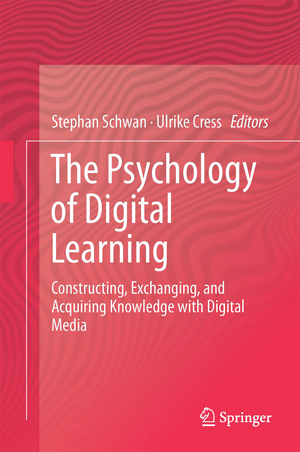

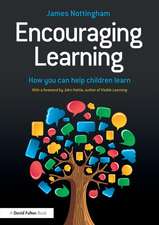


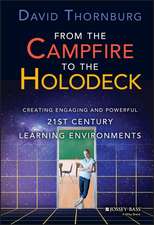




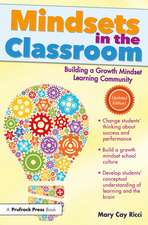



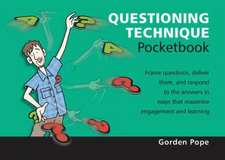
![I Just Want to Do It My Way! Activity Guide for Teachers [With CDROM]: My Story about Staying on Task and Asking for Help](https://i0.books-express.ro/bt/9781934490457/i-just-want-to-do-it-my-way-activity-guide-for-teachers-with-cdrom.jpg)